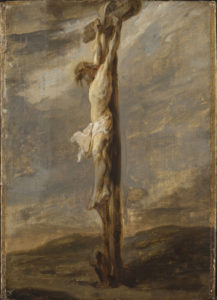
A Musical Meditation for Good Friday
 The Crucifixion – Rembrandt, 1646. Public Domain
The Crucifixion – Rembrandt, 1646. Public Domain
As we approach Good Friday, this week, I am aware of how much scripture, prayer, and music have played an integral part in calming and easing my heart during this pandemic. It is easy to turn on the radio, television, or computer only to be inundated with images and stories of our world battling something the likes of which we have never seen. I miss, dearly, the relational part of worshipping as the Body of Christ at CCA; I miss singing with you all as we offer our hearts up to the Lord.
Traditionally, at CCA, we would have a service on Good Friday where we would visit the Stations of the Cross or would remember the Seven Last Words of Christ. However, due to social distancing, we cannot meet together to worship and walk alongside Jesus as he offers himself up for our sake, but we can come together through Heinrich Schütz’s Die Sieben Worte Jesu Christi am Kreuz (The Seven Words of Christ on the Cross).
This five-part work from composer and organist Heinrich Schütz is an accumulation from all four Gospels of the expressions of Jesus from the cross, known as the Seven Last Words. The oratorio arranged for five voices (SATTB), five instruments, and continuo was composed in 1645 during the Thirty Years War with a final revision in 1657.
The work starts and ends with choral motets using the lyrics from the first and last verse of the hymn “Da Jesus an dem Kreuze stund” written by Johann Böschenstein. The instruments, alone, play two instrumental selections (sinfonia) for the second and fourth movements. And in the middle of the composition, the voices coupled with continuo uses a recitativo-style of narration intertwined with moments of choral polyphony to convey the Seven Last Words of Christ. The driving and haunting dissonances help portray the anguish, hope, and assurances given to us from Jesus as He offers Himself as the ultimate sacrifice.
In case you are not familiar with the composer, Heinrich Schütz was born in Dresden in 1585 and eventually moved to Weissenfels with his family. In the following years, the local church cantor and organist would both train this son of an innkeeper as a singer. As fate would have it, a guest of the inn would overhear Schütz singing as he was working in his father’s inn. This guest, Landgrave Moritz of Hessen-Kassel, would successfully lobby Heinrich’s parents to allow him to educate young Heinrich. Schütz would then quickly become a rising star so much that the Kappelmeister would take charge of his music instruction. Though Schütz would receive his educational training as a lawyer, Landgrave Moritz would award Schütz a two-year grant to study in Italy with Giovanni Gabrielli. Schütz would stay in Vienna with Gabrielli for a total of four years only to return to the service of Moritz as an organist. He would later return to Italy in 1628 where he would receive additional musical training, but this time from composer Claudio Monteverdi.
Of note, many sources over time have mentioned that Schütz’s compositional style was very progressive in his early writing and that he served as a major influence in the transition from Renaissance to Baroque. This influence was apparent through his education in the Italian musical influence which he brought to north Germany. His compositional style would later influence German composers the like of Jan Sweelinck and J.S. Bach.
Through the recording shared, listen for the influence of Schütz’s two teachers Gabrielli and Monteverdi. In the voices and instruments of the recording, can you hear Jesus calling out to God on behalf of us? Can you hear Him as he journeys through this traumatic and overwhelming task given to him? A task that unites us all as He offers His life as ransom for us. This Good Friday, I implore you to take twenty minutes to listen as Schütz directs our hearts and minds toward the Lamb. Incline your heart toward the Lord instead of the dreary news cycle.
Linked in this email is a recording of Ars Nova Copenhagen performing under the direction of English choral musician and conductor, Paul Hillier. You can find out more about this ensemble via their website: http://www.arsnova.dk/en
Heinrich Schütz – Die sieben Worte Jesu Christi am Kreuz https://www.youtube.com/watch?v=rfXo_zCwkno
Blessings,
Matthew Flora
Music Ministry
